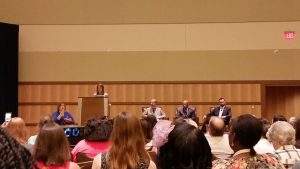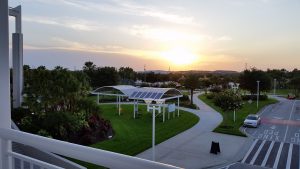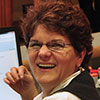This article is more than 5 years old.
My ALA conference was focused on two primary objectives: begin work related to the Sustainability Round Table, (SustainRT, to which I was just elected Member-at-Large) and get as much information on diversity and inclusion through ALA’s diversity programming as I could squeeze into my schedule. The work of the SustainRT board started early as I was representing SustainRT to the Round Table Coordinator Assembly on Friday morning. Since no other member of SustainRT arrived in Orlando early enough to attend, I was invited to represent the group. This group was made up of all of the chairs or coordinators of the round tables in ALA. The agenda was mostly about issues related to round tables’ functions within ALA, (like how to archive the born digital meeting minutes, and how libraries are using the ALA “Libraries Transform” media campaign.) I was rather surprised at how many Round Tables ALA has. (Disappointedly, we actually sat at rectangular tables.)
I am also SustainRT’s representative to The Office of Diversity, Literacy and Outreach Services in ALA. This office supports libraries in their efforts to expand Equity, Access and Diversity. I participated in a SustainRT panel discussion called “Planting the Seeds: Libraries and Librarians as Change Agents for Sustainability in Their Communities,” which happily also got a mention in the American Libraries Magazine blog. I discussed ZSR’s efforts to reduce waste generated during our semester’s end Wake the Library events.
It was quite serendipitous that John Lewis, fresh from his sit-in on the floor of the House of Representatives in Washington DC, was scheduled to speak about his graphic novel series called “March”.
ALA president Sari Feldman introduced John Lewis, his co-author, and his illustrator to a very full ballroom. His words were moving, heartfelt and inspiring. My favorite quote when talking about the influence public libraries have over youth was when he said “Encourage kids to get into trouble, necessary trouble, continue to do just that!” He and his co-authors earned several standing ovations. Earlier that morning, I also attended a memorial service for the victims of the Pulse nightclub shooting. John Lewis also made a brief appearance there and offered words of support. The memorial had speakers Sari Feldman along with members of the GLBT Round Table and Social Responsibilities Round Table. There wasn’t a dry eye anywhere around me.
The most helpful Diversity and Inclusion session I attended was one entitled “No Room at the Library: the Ethics of Diversity” in which the programmers offered, through skit form, four different situations related to marginalized people and had us react to the question “how would you handle that situation?” The members of the audience then got up and gave their reactions, based on library policy, or sometimes just on what they thought was right. One situation discussed how to handle a request for a community room for a group who wanted to have a meeting that excludes white people so they can have a frank discussion about racial inequality in their community. Another was about whether it is important to intercede in a conversation between a youth and his mother when his mother is committing a microagression to a staff member wearing a hijab. The reactions to these important questions were fascinating as we frankly discussed options. Everybody’s position was “right” even if they were very different. Such is the nature of ethical dilemmas.
ALA Annual in Orlando will go down as one of the best, and certainly one of the hottest ALA’s I’ve attended. (The humidity even made it feel as though it were hotter than Vegas to me.)
Also, I wouldn’t be doing my job as a Member-At-Large of SustainRT if I didn’t encourage you to join the round table. The cost is just $10 per year and you can add it to your ALA membership at any time!
